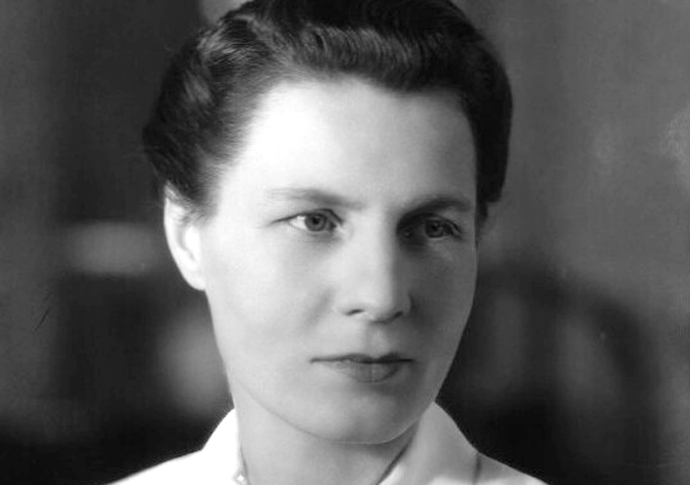A doughty champion
A new biography of Labour MP Edith Summerskill is a timely reminder of her contribution to women’s rights, says Dan Carrier
Thursday, 15th September 2022 — By Dan Carrier

Edith Summerskill
“MAY I ask,” said Labour MP Edith Summerskill in the House of Commons in July 1940, “how we are to fight in the streets and in the houses if women are excluded from the Local Defence Volunteers?”
Such a statement from her spot on the green benches was typical of Edith: sensible and to the point, highlighting the madness of inequality between the sexes.
It was a topic the MP forged a career on, and in a new biography, Mary Honeyball chronicles Summerskill’s extraordinary and inspirational life. Her comment on why the Home Guard needed to train women as well as men cut to the quick, and was a typical Summerskill intervention.
The author served as a Labour MEP for 19 years, and has written widely on women in the Labour movement. It gives her the background to consider a trailblazing career that saw Summerskill train as a doctor, set up a surgery that catered for poverty-stricken Londoners during the Depression, spend a lifetime fighting for access to safe medical help for women, family planning, and a whole strata of campaigns in a world where sexism was an accepted reality.
Born in 1901, Edith’s family home was in Doughty Street, Bloomsbury. Her father, a doctor, would set out on horseback to help the poor of the neighbourhood. Her childhood was marked by her father’s unfaithfulness to his wife, and a heavy regime of discipline ladled out by her mother.
But Edith’s parents were ambitious for their daughter and wanted her to have every opportunity in education and work. It meant they were enthusiastic when Edith chose to study medicine.
Aged 19, she was training at Charing Cross Hospital when she met another student, Jeffrey Samuel. It was the beginning of a life-long love, and the forging of a dynamic partnership. After qualifying and marrying, the couple set up a GP surgery in Wood Green and were known as the doctors for the poor.
In 1934, they found a home in Fitzroy Park, Highgate, and gave it a fashionable Modernist makeover. It was from this N6 base they set out to make a better world for as many as they could.
Edith’s public life began when she joined regional health committees, though she had already allied her views to the left.
“It was the suffering of a woman that finally drew me into the political world,” Honeyball quotes Edith. “At the age of 22, a newly qualified doctor, I attended my first confinement. My knock was answered by the young husband, pallid and shabby, with the familiar signs of long-term unemployment on him.
“Upstairs lay the patient, a girl of my age. By the bed stood a cot, and standing grasping the wooden bars was a child with a bulging forehead and crooked legs – the classic picture of rickets. In that room, that night, I became a socialist – I joined the fight. Not against a class but against a system.”
When war broke out in 1939 her husband joined the Royal Medical Corps. She led initiatives to bring women into more wartime roles. She used her expertise to look at the effect rationing was having on diets, and how housewives were coping.
Then she turned her attention to the Home Guard, arguing that if there was an invasion, keeping women solely in roles as clerks and cooks was a waste.
“Edith thought the opposition to women’s involvement in combat lay in persistent 19th-century attitudes to femininity, notably the idea that women were weak and gentle creatures who needed protection,” she writes. “Edith maintained that, if once true, this was no longer the case. Aerial bombardment did not discriminate.”
The MP would become a key figure in the 1945 Labour landslide, saying a the time “The Labour government with its massive support in Parliament represented the strength of feeling in the country.” She worked at the Ministry of Food – an important post that combined a number of areas of interest, from health and well being to supporting families.
In her postwar political career, Edith was there at the front of social and legal changes. She fought for equal pay – including her unwavering support for the Dagenham Ford machinists who struck for equal pay, and spoke out in favour from her elevated seat in the House of Lords, promoting the 1975 Discrimination Act.
“It is a huge indictment of the way political leaders are remembered and celebrated that Edith’s fame during her life time did not translate into a concrete legacy,” writes Honeyball. She was puzzled why Summerskill’s story is not widely known today.
She points out that Edith had a high media profile but was barely mentioned in the various published diaries of the period’s politicians.
Her skills should have made her a huge asset to government, but the fact she was a woman meant her behaviour was scrutinised and criticised in a manner her male peers would find unimaginable.
Now, this brilliantly evocative, informative and thoughtful biography not only tells the story of a heroic and inspirational person, but traces the changes in our society over the eight decades of her life, from the cramped social mores of Victorian Britain to the recognisably post-Elizabethan world of today.
• Edith Summerskill: The Life and Times of a Pioneering Feminist Labour MP. By Mary Honeyball, Bloomsbury Publishing, £25